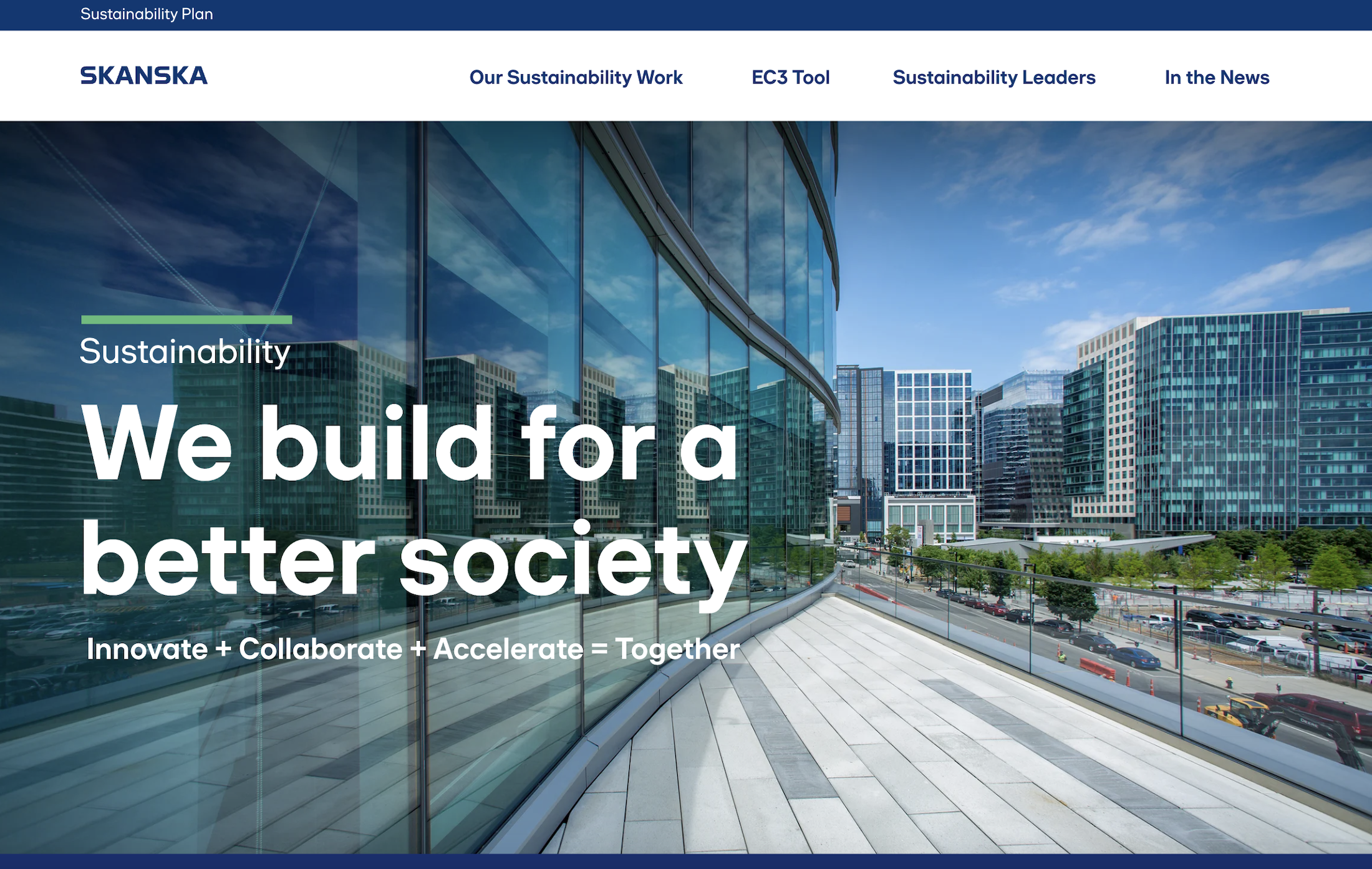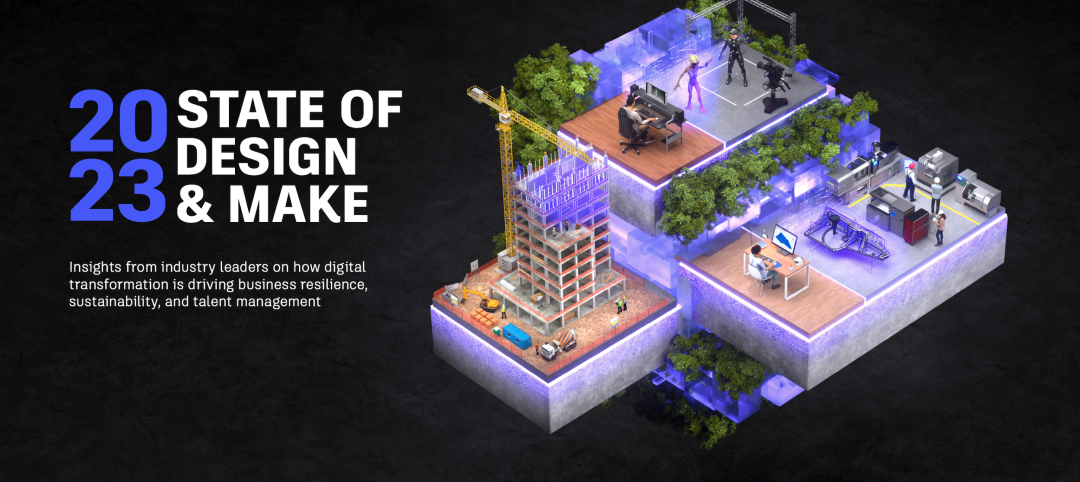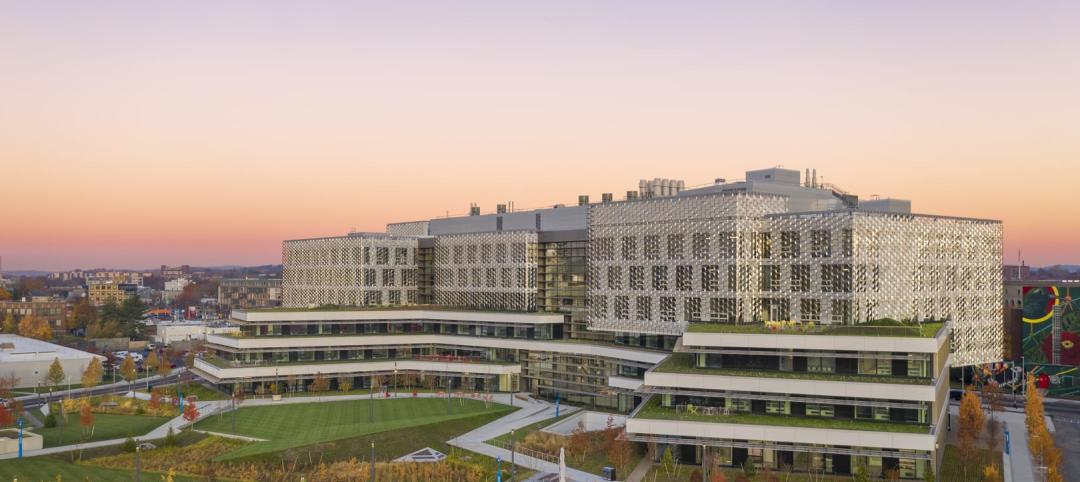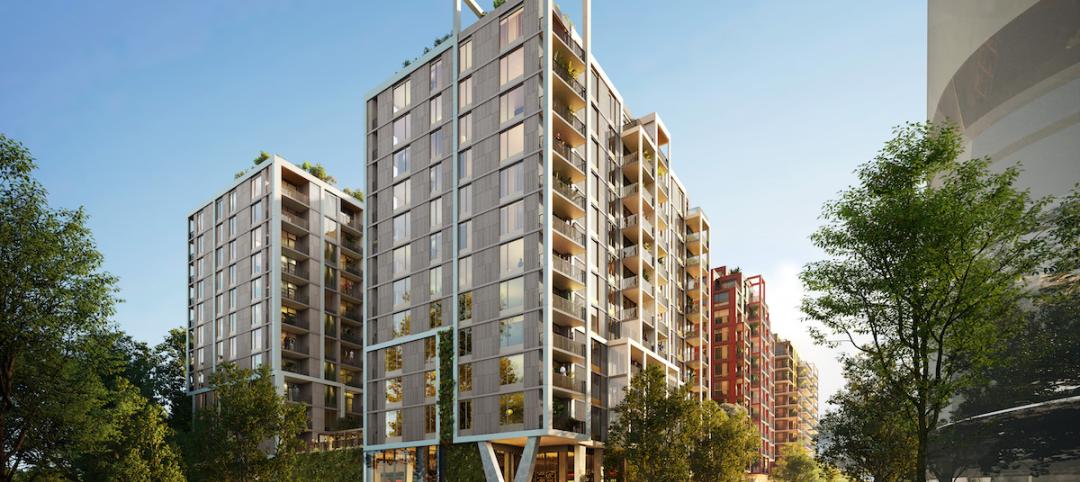Skanska, a global leader in sustainable building, has restructured its Sustainability Team to better serve client and company goals. Co-led by Steve Clem and Myrrh Caplan, who together bring decades of experience, the team will allow Skanska to continue to set the bar for the industry.
“Steve and Myrrh are central to our commitment to sustainability,” said Steve Stouthamer, Executive Vice President, Project Planning, Skanska USA Building. “As Senior Vice Presidents, they’ll leverage Skanska’s global and domestic initiatives to protect our environment and ensure the resilience of the communities we build in. By harnessing their collective expertise, we can make significant strides toward our decarbonization goals while continuing to set the bar for sustainable industry practices.”
With Clem and Caplan at the helm, Skanska is well positioned to support clients and maximize opportunities for sustainability consulting, as state and federal agencies implement stricter sustainability requirements for buildings and construction. Skanska’s robust Sustainability Team, located throughout the country, will continue supporting Clem and Caplan with helping clients meet and exceed their sustainability goals, advancing industry and client outcomes through innovation and research, and identifying opportunities to create more value-add solutions.
Since joining Skanska as a Project Manager in 2005, Caplan has helped shape Skanska’s national approach to sustainable building. She established the company’s first national Green Construction program and chaired Skanska’s first National Green Council. Throughout the past decade, she has managed multiple initiatives including carbon lifecycle analysis and efforts that benefit clients and the industry. Caplan leads Skanska's National Sustainability Team, made up of consultants and advisors.
Caplan was named a 2022 LEED Fellow by the U.S. Green Building Council (USGBC), one of twenty professionals from around the world recognized for their work in advancing green building practices. To date, Caplan has advised on nearly 300 certified projects and projects seeking LEED, Living Building Challenge, WELL, Envision, and other certifications. In 2023, Caplan co-created the Associated General Contractors of America Task Force on Decarbonization and Carbon Reporting to address the challenges around reporting and reducing carbon emissions within construction. She sits on the board of mindfulMaterials, serves on several industry committees, and participates in research with key partners.
Steve Clem joined Skanska as a project engineer in 1997 and over the years, established himself as one of Skanska’s staunchest sustainability leaders. In his role, Clem is responsible for setting and achieving Skanska’s decarbonization goals in the United States and works with construction teams to identify sustainable procurement solutions for clients including the use of mass timber. Clem’s efforts to reduce the industry’s embodied carbon began over 15 years ago and he has been influencing procurement with the Embodied Carbon in Construction Calculator (EC3 Tool) since Skanska co-created and launched the tool in 2019. Clem has also authored multiple cost studies that demystify the adoption of environmentally preferable construction strategies.
Clem spearheaded Skanska’s early participation in the Living Building Challenge – first with the influential Living Building Challenge Financial Study and then with the Bertschi School project. He holds certifications from the US Green Building Council, International Living Future Institute, and OSHA, among other accrediting agencies. Clem is also president of the construction safety non-profit, SafeBuild Alliance, and sits on the board of Building Transparency, which manages the EC3 Tool.
The built environment accounts for nearly 40 percent of carbon emissions globally, with approximately 11 percent embodied in construction materials and an estimated 28 percent stemming from building operations. To reduce its impact on the planet, Skanska has had a long trajectory of environmental accomplishments under Clem and Caplan’s leadership:
- Skanska set an ambitious target to achieve carbon neutrality by 2045 in its own operations and across its entire value chain. As an interim target, its development operations aim to achieve a 70 percent reduction by 2030.
- Skanska has been working on mass timber projects for more than a decade, improving construction schedules while reaping the environmental, health, and aesthetic benefits.
- Skanska has delivered over 44 million square feet of space that has been certified across several systems including LEED®, Envision™, Green Globes, Fitwel and Living Building Challenge. On our own development projects, we target a minimum of LEED® Gold, with many projects achieving LEED Platinum.
- Skanska supports the United Nations Sustainable Development Goals to address issues like climate action, sustainable cities and communities, and responsible consumption and production.
- Skanska is ISO 14001 certified to ensure consistent environmental performance and continuous improvement. Skanska’s ISO 14001 certification program has been recognized by the U.S. Green Building Council.
- Skanska partners with organizations to transform the industry, investing in research and technology, and pioneering sustainable construction practices.
More Information on Skanska’s Sustainability Initiatives:
About Skanska
Skanska uses knowledge & foresight to shape the way people live, work, and connect. More than 135 years in the making, we’re one of the world’s largest development and construction companies. We operate in select markets throughout the Nordics, Europe and the United States. Skanska in the U.S. is headquartered in New York City with 29 offices around the country. In 2022, construction in the U.S. generated $6.9 billion in revenue, and as a developer in the U.S., Skanska has invested a total of $3.5 billion in commercial and multi-family projects. Together with our customers and the collective expertise of our 6,500 teammates in the U.S. and 28,000 globally, we create innovative and sustainable solutions that support healthy living beyond our lifetime.
Related Stories
Sustainability | May 1, 2023
Increased focus on sustainability is good for business and attracting employees
A recent study, 2023 State of Design & Make by software developer Autodesk, contains some interesting takeaways for the design and construction industry. Respondents to a survey of industry leaders from the architecture, engineering, construction, product design, manufacturing, and entertainment spheres strongly support the idea that improving their organization’s sustainability practices is good for business.
Concrete Technology | Apr 24, 2023
A housing complex outside Paris is touted as the world’s first fully recycled concrete building
Outside Paris, Holcim, a Swiss-based provider of innovative and sustainable building solutions, and Seqens, a social housing provider in France, are partnering to build Recygénie—a 220-unit housing complex, including 70 social housing units. Holcim is calling the project the world’s first fully recycled concrete building.
Green | Apr 21, 2023
Top 10 green building projects for 2023
The Harvard University Science and Engineering Complex in Boston and the Westwood Hills Nature Center in St. Louis are among the AIA COTE Top Ten Awards honorees for 2023.
Sustainability | Apr 20, 2023
13 trends, technologies, and strategies to expect in 2023
Biophilic design, microgrids, and decarbonization—these are three of the trends, technologies, and strategies IMEG’s market and service leaders believe are poised to have a growing impact on the built environment.
Resiliency | Apr 18, 2023
AI-simulated hurricanes could aid in designing more resilient buildings
Researchers at the National Institute of Standards and Technology (NIST) have devised a new method of digitally simulating hurricanes in an effort to create more resilient buildings. A recent study asserts that the simulations can accurately represent the trajectory and wind speeds of a collection of actual storms.
Green | Apr 18, 2023
USGBC and IWBI unveil streamlined certification pathway for LEED and WELL green building programs
The U.S. Green Building Council, Green Business Certification Inc., and the International WELL Building Institute released a streamlined process for projects pursuing certifications for the LEED green building rating system and the WELL Building Standard. The new protocol simplifies documentation for projects that are pursuing both certifications at the same time or that have already earned one certification and are looking to add the other.
K-12 Schools | Apr 18, 2023
ASHRAE offers indoor air quality guide for schools
The American Society of Heating, Refrigerating and Air-Conditioning Engineers (ASHRAE) has released a guide for educators, administrators, and school districts on indoor air quality. The guide can be used as a tool to discuss options to improve indoor air quality based on existing HVAC equipment, regional objectives, and available funding.
Urban Planning | Apr 17, 2023
The future of the 20-minute city
Gensler's Stacey Olson breaks down the pros and cons of the "20-minute city," from equity concerns to data-driven design.
Multifamily Housing | Apr 17, 2023
World's largest multifamily building pursuing ILFI Zero Carbon certification under construction in Washington, D.C.
The Douglass, in Washington, D.C.’s Ward 8, is currently the largest multifamily housing project to pursue Zero Carbon Certification from the International Living Future Institute (ILFI).
Urban Planning | Apr 12, 2023
Watch: Trends in urban design for 2023, with James Corner Field Operations
Isabel Castilla, a Principal Designer with the landscape architecture firm James Corner Field Operations, discusses recent changes in clients' priorities about urban design, with a focus on her firm's recent projects.

















